新人教版五年级英语各单元词汇及重点句子
人教版五年级英语上册各单元以及下册unit1知识点详细归纳(附带练习题)

Un it 1 What 'she like 、单元词汇old年老的polite 有礼貌的clever 聪明的you ng年轻的funny滑稽的kind和蔼的strict严格的hard-working工作努力的helpful愿意帮助的shy害羞的二、单元知识点一般疑问句的改法:①类句子:含有be动词作谓语的句子、或者含有情态动词(will、can、should等)的英语句子,改为疑问句时,把be动词/情态动词提到句首即可!例如:He is very helpful Is he very helpful ?They are hard-working Are they hard-working ?Mike can do kung fu Can Mike do kung fu ?②类句子:含有实义动词作谓语的句子,改为疑问句时,在句首加do/does,主语是第三人称单数时加does,并且谓语动词要去掉三单形式变回原形!例如:I know Mary 宀Do you know Mary ?They play football on the playground ? Do they play football on the playground ?三单形式:当主语是第三人称单数时,后面的实义动词谓语必须是三单形式(一般在实义动词后加s)例如:I read books 宀He reads booksYou play the piano He plays the piano三单形式的句子改为一般疑问句:Does he read books?Does he play the piano ?另外要注意:第一人称和第二人称要互相转换!练习:将下列句子改为一般疑问句:1、I am very helpfull at home _________________________________2、She will come to my birthday party __________________________3、I know ________________________________________________4、He knows _____________________________________________1、Do you know Mr You ng ?这是一个疑问句,陈述句原来是肯定回答:Yes, I do否定回答:No, I don '我的笔I pen (x) my pen (V)I know Mr You ng,②类句子你的尺子you ruler (x) your ruler (V)____ pen 我的钢笔__________ parents 她的父母___________ h ouse 他们的房子3、Is your English teacher strict?原来的陈述句:My English teacher is strict,①类句子,所以改为疑问句只须把be动词提到句首即可,my 变为yourBe 动词+ 人+ 描述体貌特征或性格特点的形容词?意为“某人是 ......... 的吗?”肯定回答:Yes,人+ be动词否定回答:No,人+ be动词not例如:——Is your P.E. teacher funny?——Yes, he is——Are your parents strict ?——No, they aren 't 你的体育老师高吗?是的,她很高你的数学老师年轻吗?不,她不年轻4、如何询问别人某一学科的老师是谁?可以借用特殊疑问词who (谁)的帮助,Who ' s your +学科+ teacher ?意为"你的........ 老师是谁?”回答:Mr/Mrs/Miss + 姓氏例如:——Who is your English teacher ?——Miss Green——Who is your math teacher ?——Mr Ma5、what is he like ?在这句话中, like 不是“喜欢”的意思,而是“像....... 一样”的意思,因为like有两种词性:① 动词,意为“喜欢”,实义动词谓语,不能和be动词同时出现;I like hamburger ;I like apples and grapes② 介词,意为“像……一样”,可以跟在be动词后面作表语;Their child is like him His words are like wisdom询问别人的体貌特征或性格特点的句型:What ' s +某人+ like?,意为询问“某人是像……样的/某人怎么样?” 回答:He' s/She's+ 描述体貌特征或性格特点的形容词.例如:——What is she like?——She is tall and thin——What is your art teacher like ?——He is young and funny6、频率副词sometimes (有时候),usually (通常),often (经常),通常放在主语和动作之间I sometimes read books in the morningI often play football on the playgroundI usually do my homework at 8 o 'clock7、 m ust 是情态动词,情态动词后面跟谓语动词原形(两类谓语)He is tall and strongHe must be tall and strongShe is our new English teacherShe will be our new English teacher 8、 l et me help youLet sb do sth , sb = somebody (某人),sth = something (某事),意为"让某人做某 事”, sb 如果是人称代词,那必须得是宾格形式的Let 'sgo to school = let us go to school Let Mike help you Let him come inUnit 1 单元习题、选出不同类的单词,并将其序号填到题前的括号内。
新人教版PEP五年级英语上册各单元知识点总结(完美版)
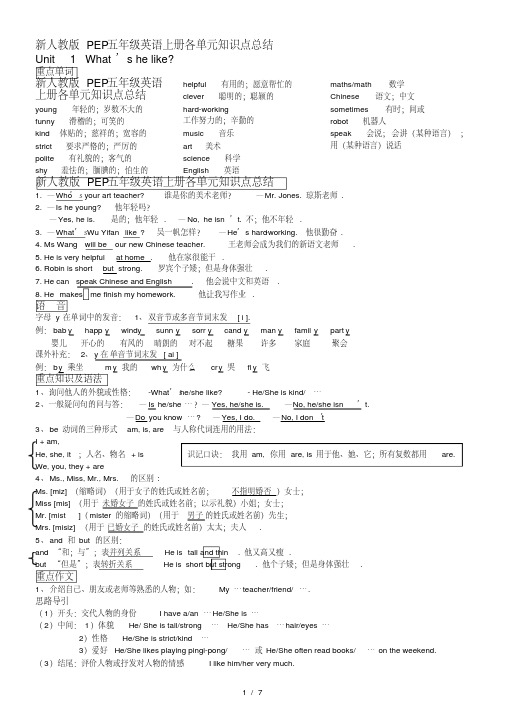
新人教版PEP五年级英语上册各单元知识点总结Unit 1 What’s he like?重点单词新人教版PEP五年级英语上册各单元知识点总结young 年轻的;岁数不大的funny 滑稽的;可笑的kind 体贴的;慈祥的;宽容的strict 要求严格的;严厉的polite 有礼貌的;客气的shy 羞怯的;腼腆的;怕生的helpful 有用的;愿意帮忙的clever 聪明的;聪颖的hard-working工作努力的;辛勤的music 音乐art 美术science 科学English 英语maths/math 数学Chinese 语文;中文sometimes 有时;间或robot 机器人speak 会说;会讲(某种语言);用(某种语言)说话新人教版PEP五年级英语上册各单元知识点总结1. —Who’s your art teacher? 谁是你的美术老师?—Mr. Jones.琼斯老师.2. —Is he young? 他年轻吗?—Yes, he is. 是的;他年轻. —No, he isn’t.不;他不年轻.3. —What’s Wu Yifan like? 吴一帆怎样?—He’s hard-working. 他很勤奋.4. Ms Wang will be our new Chinese teacher. 王老师会成为我们的新语文老师.5. He is very helpful at home. 他在家很能干.6. Robin is short but strong. 罗宾个子矮;但是身体强壮.7. He can speak Chinese and English. 他会说中文和英语.8. He makes me finish my homework. 他让我写作业.语音字母y在单词中的发音:1、双音节或多音节词末发[ i ].例:bab y happ y windy sunn y sorr y cand y man y famil y part y婴儿开心的有风的晴朗的对不起糖果许多家庭聚会课外补充:2、y在单音节词末发[ ai ]例:by 乘坐m y 我的wh y 为什么cry 哭fl y 飞重点知识及语法1、询问他人的外貌或性格:-What’s he/she like? - He/She is kind/…2、一般疑问句的问与答:—Is he/she…?—Yes, he/she is.—No, he/she isn’t.—Do you know…? —Yes, I do.—No, I don’t3、be动词的三种形式am, is, are与人称代词连用的用法:I + am,He, she, it;人名、物名+ isWe, you, they + are4、Ms., Miss, Mr., Mrs.的区别:Ms. [miz](缩略词)(用于女子的姓氏或姓名前;不指明婚否)女士;Miss [mis](用于未婚女子的姓氏或姓名前;以示礼貌)小姐;女士;Mr. [mist](mister的缩略词)(用于男子的姓氏或姓名前)先生;Mrs. [misiz](用于已婚女子的姓氏或姓名前)太太;夫人.5、and和but的区别:and “和;与”;表并列关系He is tall and thin. 他又高又瘦.but “但是”;表转折关系He is short but strong. 他个子矮;但是身体强壮.重点作文1、介绍自己、朋友或老师等熟悉的人物;如:My …teacher/friend/….思路导引(1)开头:交代人物的身份I have a/an…He/She is…(2)中间:1)体貌He/ She is tall/strong…He/She has …hair/eyes…2)性格He/She is strict/kind…3)爱好He/She likes playing pingi-pong/…或He/She often read books/… on the weekend. (3)结尾:评价人物或抒发对人物的情感I like him/her very much.识记口诀:我用am, 你用are, is用于他、她、它;所有复数都用are.2、范文:(1)课本P9 Read and write(2)My Chinese teacherI have a new Chinese teacher. She is Ms. Chen. She is tall and thin. She has big eyes and long black hair. She is kind and funny. Sometimes she is strict, too. She is hard-working. She likes reading. Her class is so much fun. We all like her.Unit 2My week重点单词新人教版PEP五年级英语上册各单元知识点总结Monday (Mon.) 周一Tuesday (Tue./Tues.) 周二Wednesday (Wed./Weds.) 周三Thursday (Thur./Thurs.) 周四Friday (Fri.) 周五Saturday (Sat.) 周六weekend 周末(周六、日)wash my clothes 洗衣服watch TV 看电视do homework 做作业read books 看书play football 踢足球on the weekend 在周末play sports/do sports 做体育运动listen to music 听音乐play ping-pong 打乒乓球新人教版PEP五年级英语上册各单元知识点总结1. —What do you have on Thursday s? 星期四你们上什么课?—I have math, English and music. 我们上数学、英语和音乐课.2. —What do you do on Thursdays, Grandpa? 爷爷;星期四你要做什么?—I have a cooking class with your grandma. 我和你奶奶去上烹饪课.3. —Do you often read books in this park? 你经常在这个公园看书吗?—Yes, I do.是的—No, I don’t.不是4. Look at my picture. 看我的图片.5. You look tired. 你看起来很累.6. You should play sports every day. 你应该每天做运动.语音字母组合ee, ea在单词中的的发音:[ i: ]例:fee t bee f m eet see fee d tea rea d ea t rep ea t脚牛肉遇见看见喂养茶阅读吃重复注:1、ee组合绝大部分发长音[ i: ];只有少部分发短音[ i ];如:coffee 咖啡2、ea字母组合除了发[ i: ];还有可能发[ e ]等发音;如:bread 面包;或者发[ ei ];如:great 好极了重点知识及语法1、询问做什么事/活动:—What do you do …? —I often play ping-pong…询问星期几上什么课:—What do you have on…? —We have English class…2、一般疑问句的问与答:—Do you often read books? —Yes, I do. —No, I don’t.3、on+具体某一天(年月日;星期);如:on Monday/Tuesday…课外at+具体时刻(…点钟);如:at 12 o’clock 在十二点整补充:in+大致时间(年月;早中晚);如:in 2014 在2014年in the morning/afternoon/evening4、play + 球类、棋类、娱乐活动;如:play football/ping-pong补充:play + the + 乐器(第四单元知识);如:play the pipa/piano/violin…重点作文1、描写一周的生活;如:My week思路导引(1)开头:简单的自我介绍:My name’s…/ I’m…(2)中间:1)介绍周一至周五的情况;可以着重介绍自己最喜欢的那一天:I go to school from Monday to Friday. I like…because I have…2)介绍自己周六、日的活动:I often watch TV/…on the weekend.(3)结尾:This is my week. What about yours?2、范文:My weekMy name is Li Ming. I go to school from Monday to Friday. I like Tuesdays and Thursdays, because I havemusic and PE. I often do my homework and read books on Saturdays. I often play ping-pong on Sundays.Unit 3What would you like? 重点单词新人教版PEP五年级英语上册各单元知识点总结hamburger 汉堡包tea 茶sandwich 三文治salad 沙拉fresh 新鲜的;刚摘的healthy 健康的delicious 美味的;可口的hot 辣的;辛辣的sweet 含糖的;甜的hungry 饿的thirsty 渴的;口渴的favourite 特别喜爱的food 食物drink 喝;饮carrot 胡萝卜chicken 鸡肉onion 洋葱milk 牛奶bread 面包beef noodles 牛肉面fish sandwich 鱼肉三明治tomato soup 西红柿汤新人教版PEP五年级英语上册各单元知识点总结1.—What would you like to eat? 你想吃什么?—A sandwich, please. 请给我一个三明治.—What would you like to drink? 你想喝什么?—I’d like some water. 我想喝点水.2. —What’s your favourite food?你最喜欢吃什么食物?—Noodles. They are delicious. 面条.面条很好吃.3. My/His /Her favourite food is fish. 我/他/她最喜欢的食物是鱼.4. I’m hungry/thirsty. 我饿/渴了.5. I don’t like beef but chicken is OK. 我不喜欢牛肉但是鸡肉也可以.6. Onions are my favourite vegetable. 洋葱是我最喜欢的蔬菜.7. I like vegetables but not carrots. 我喜欢吃蔬菜但不喜欢胡萝卜.语音字母组合ow在单词中的发音:[ au ] ;[例:[ au ] cow奶牛flow er 花wow哇dow n 向下how如何;怎样now现在[slow慢的snow雪yellow黄色window窗户snow y 下雪的tomorrow明天重点知识及语法1、询问想要吃/喝什么:—What would you like to eat/drink? —I’d like…2、询问最喜欢的事物:—What’s your favourite food/vegetable/…? —My favourite food/…is…/I like…3、名词复数的规则变化:(1)直接加s;(2)以s, x, sh, ch结尾的;加es;如;bus es box es sandwich es(3)以o结尾;有生命的加es;如;potato es tomato es无生命的加s;如;photo s piano s zoo s补充:(4)以辅音加y结尾;改y为i再加es;如;famil ies bab ies以元音加y结尾;直接加s;如;boy s day s(5)以f或fe结尾;改f为v再加es;如knife-kni ves小刀leaf-lea ves树叶4、some+可数/不可数名词例:some apple s(可数)some water/rice/juice/bread/…(不可数)课外补充:不可数名词(词后不可以加-s/es;所接动词用单数is /V-s/es)液体water milk tea orange(桔汁)coke juice气体air(空气)食物food rice bread fruit肉类meat(肉)fish beef chicken物质work(工作)paper(纸)time music weather(天气)snow money重点作文1、描述自己和家人最喜爱的食物思路导引(1)开头:简单介绍自己的家庭成员:There are…people in my family. They are…(2)中间:分别介绍每个家庭成员最喜爱的食物时什么:…favourite food is…/…is…favourite./…like(s)…best.(3)结尾:穿插说明喜欢的原因:It’s/They’re…2、范文:(1)课本P29 Read and write(2)There are four people in my family. They are my parents, my brother and me. My mother likes saladbest. It’s fresh. Beef is my father’s favourite. He thinks(认为)it’s delicious. My brother likes ice cream. It’ssweet. My favourite food is fish. It’s very healthy.Unit 4 What can you do?重点单词新人教版PEP五年级英语上册各单元知识点总结sing English songs 唱英文歌曲play the pipa 弹琵琶do kung fu 打功夫draw cartoons 画漫画swim 游泳speak English 说英语cook 烹饪;烹调play basketball 打篮球play ping-pong 打兵乓球draw pictures 画画clean the classroom 打扫课室新人教版PEP五年级英语上册各单元知识点总结1. We’ll have an English party next Tuesday! 我们下周二将举行英语派对.2. —What can you do for the party? 你能为派对做些什么呢?—I can sing English songs. 我能唱英文歌.3. How/What about you? 你呢?4. Can you do any kung fu? 你会打功夫吗?—Yes, I can. 是的;我会. —No, I can’t. 不;我不会.5. No problem. I can help you. 没问题.我会帮你.6. I can play ping-pong, but I can’t swim. 我会打乒乓球;但我不会游泳.7. Please send me an email at robin@. 请给我发邮件;邮箱robin@.语音字母组合oo在单词中的发音:[ u ];[ u: ]例:[ u ] loo k 看goo d 好的boo k 书coo k 烹饪woo d 木头foo t 脚助记口诀: 1. 看look好good书book;砍柴wood做饭cook洗脚foot.2. 押韵记忆:Look good book, cook wood foot.[ u: ] ball oo n 气球foo d 食物zoo动物园noo dles 面条注:字母组合oo发音少数发短音[ u ];多数发长音[ u: ] .重点知识及语法1、询问对方会做什么事情:—What can you do? —I can play the pipa.2、can句型的否定句:I can’t play the pipa.3、can句型的一般疑问句的问与答:—Can you do any kung fu? —Yes, I can./No, I can’t.4、play + the + 乐器;例play the erhu /pipa /piano…play + 球类、棋类、娱乐活动;例play basketball/football/ping-pong…5、some与any的异同:相同之处:都有“一些”的含义;不同之处:some+可数名词复数/不可数名词(用于肯定句中)例:I can do some kung fu. 我会打功夫.any+可数名词复数/不可数名词(用于否定句或疑问句中)例:I can’t do any kung fu. 我不会打功夫. Can you do any kung fu? 你会打功夫吗?课外补充:1)any还可以用于肯定句;作“任何的”解.例:Any student can answer this question. 任何学生都能回答这个问题.2)在表示建议;请求的疑问句中;或期望得到肯定回答时;用some而不用any.例:Would you like some coffee? 你想来点咖啡吗?重点作文1、描写自己或家庭成员会做的事情;如:I’m helpful / Super family;思路导引(1)开头:介绍自己或家庭成员的基本情况:I’m… I’m…years old.I have a super family. There are three people in my family. They are…(2)中间:介绍自己在家和在学校里会做的事情/介绍家人的外貌性格以及会做的事情:I can…at school. I can…at home.My father is strong. He can do some kung fu. My mother is…She can…(3)结尾:总结This is me. What can you do?This is my family. I love my family. Can you tell me your family?/What about your family?2、范文:(1)课本P43 Read and write(2)Hello, I’m Zhao Ming. I’m eleven years old. I’m helpful. I can clean the windows and sweep the floorat school. I can cook and wash my clothes at home.I often play the pipa on the weekend. I can play basketball. I like English very much. I can speak English well. What can you do?Unit 5重点单词新人教版PEP五年级英语上册各单元知识点总结photo 照片;相片plant 植物water bottle 水瓶bike 自行车;脚踏车in front of 在……前面beside 在旁边(附近)between 在……中间behind 在(或向)……后面above 在(或向)……上面so many 许多their 他们的lots of 许多dirty 肮脏的near 在附近house 房屋;房子;住宅新人教版PEP五年级英语上册各单元知识点总结1. Your room is really nice! 你的房间真漂亮!2. There is a big bed. 有一张床.3. 我的电脑在书桌这里.4. This is my room. 这是我的房间.5. There are so many picture s here. 这有许多照片.6. My father can draw very well. 我父亲画的很好.7 .—Where is the ball? 球在哪里?—It’s in front of the dog. 在狗的前面.8. There is a tree in front of the house. 在房子前有棵树.9. I live near the nature park. 我住在自然公园附近.语音字母组合ai, ay在单词中的发音:[ ei ]例:rai ny 下雨的rai nbow 彩虹pai nt 涂色wait 等待say说way路;方法birthd ay生日Mond ay周一day天;日子tod ay今天may可以课外补充:元音字母a在开音节中也发[ ei ] 例:cake 蛋糕face 脸name 名字重点知识及语法1、there be(is, are)句型的单复数形式:There is a clock. There are lots of flower s.课外补充:(1)There be句型的动词就近原则:例:There is a bed, a desk, two photos in my room.There are two photos, a bed and a desk in my room.(2)there be与have/has的异同:相同之处:都有“有”的含义不同之处:there be表示“某地有……”(无生命的);主语放在句末;例:There is a book on the desk. 书桌上有一本书.have/has表示“某人有……”(有生命的);放在主语(人)的后面.例:I have a book. 我有一本书.2、询问方位或地点:—Where is the ball? —It’sin front of the dog.3、lots of + 可数/不可数名词= a lot of + 可数/不可数名词“许多……”比较:many + 可数名词复数“许多……”例:There are many tree s in the forest.much + 不可数名词“许多…....”例:I drink much water every day. 我每天喝很多水. 4、动词+very well例:My father can draw very well我爸爸画的很好比较:be (am/is/are)+very good例:The book is very good. 这本书非常好.重点作文1、描写房间、卧室;如:My room / bedroom;思路导引(1)开头:总体概括自己卧室的特征I have a nice/big/clean/…room.(2)中间:描述卧室里的物品、摆设There is/are….on/beside/…… is on the desk/….(3)结尾:抒发对卧室的情感I like/love my bedroom (very much)! Can you tell me yours?2、范文:(1)课本P53 Read and write(2)My bedroomI have a nice bedroom. It’s not big but clean.I like my bedroom. Can you tell me yours?Unit 6 重点单词新人教版PEP五年级英语上册各单元知识点总结hill 山丘;小山river 河;江mountain 高山;山岳lake 湖;湖泊village 村庄;村镇house 房屋;房子;住宅tree 树;树木;乔木bridge 桥go boating 去划船nature park 自然公园people 人;人们rabbit 兔子duck 鸭子animal 动物high 高的children 孩子们(child的复数形式)新人教版PEP五年级英语上册各单元知识点总结1. Children, let’s go to the forest. 孩子们;让我们去森林吧.2. —Is there a river in the forest? 森林里有河流吗?—Yes, there is.是;有的. —No, there isn’t.不;没有.3. The nature park is so quiet! 自然公园这么安静!4. There aren’t many people. (这里)人不多.5. —Are there any tall building s in the nature park? 自然公园例有高楼吗?—Yes, there are.是;有的. —No, there aren’t.不;没有.6. —How many? 多少? —Two. 两个.7. Robin is at Mr. Jones’ house. 罗宾在琼斯先生的房子里.语音字母组合ou在单词中的发音:[ au ]例:hou se 房屋;房子mou se 老鼠sou nd 声音;听起来cou nt 数数提示:字母组合ow也有些发[ au ];例:cow奶牛how如何;怎样dow n 向下课外补充:字母组合ou在单词中还可读[ u: ];如sou p 汤grou p 群;团体;和[ ;如you ng 年轻的.重点知识及语法1、there be句型的一般疑问句的问与答:—Is there a lake? —Yes, there is. —No, there isn’t.—Are there any animal s? —Yes, there are. —No, there aren’t. 2、there be(is, are)句型的单复数形式(具体见Unit 5的重点知识及语法):例:There is a nature park near the house. There are many duck s on the lake.3、some与any在肯定句、否定句及问句中的用法:some+可数名词复数/不可数名词(用于肯定句中)例:There are some books on the desk.any+可数名词复数/不可数名词(用于否定句或疑问句中)例:There aren’t any people in the forest.Are there any tall buildings in the natures park?4、people人;人们(集体名词;明为单数;实为复数;词末不能加-s)例:There are many people in the park.重点作文1、描写景物;如:看图作文(风景图)思路导引(1)开头:Look at the picture.(2)中间:用There is/are…beside/in front of…句型描述图中所有的景物及其位置;注意要有明确的观察主线;即观察的顺序性与条理性.2、范文:(1)课本P63 Read and write(2)看图作文Look at the picture. This is a beautiful village. There are three houses in thepicture. There are many trees near them. In front of the houses, there is a river.The bridge is over the river. Behind the houses, there is a forest and a mountain.。
(完整版)新人教版五年级英语上下册单词表

新人教版五年级英语上册单元词汇表Unit1人物描述old 年老的young 年轻的funny 滑稽的,可笑的kind 慈祥的strict 严厉的polite 有礼貌的hard -working努力工作的helpful 有帮助的clever 聪明的shy 害羞的know 知道our 我们的MS 女士will 将要sometimes 有时robot 机器人him 他(宾格)speak 说(某种语言)finish 完成Unit2星期及活动Monday 周一Tuesday 周二Wednesday 周三Thursday 周四Friday 周五Saturday 周六Sunday 周日weekend 周末wash my clothes 洗衣服watch 看;观察watch TV 看电视do homework 做作业read books 看书play 玩play football 踢足球cooking 烹饪often 经常park 公园tired 疲倦的play sports 做运动should 应该every 每一个day 天;日schedule 日程安排Unit3 食物及味道sandwich 三明治salad 沙拉hamburger 汉堡包ice cream 冰淇淋tea 茶fresh 新鲜的healthy 健康的delicious 美味可口的hot 热的;辣的sweet 天的drink 喝thirsty 口渴的favourite 喜爱的food 食物Dear 亲爱的Onion 洋葱Unit4 活动及技能sing 唱song 歌曲sing English songs唱英文歌曲play the pipa 弹琵琶kung fu 功夫;武术do kung fu 练武术dance 跳舞draw 画画cartoon 卡通draw cartoons 画漫画cook 烹饪swim 游泳play basketball 打篮球play ping-pong 打乒乓球speak English 说英语we’ll=w e willparty 聚会next 接下来的wonderful 精彩的learn 学习any 任何的problem 问题no problem 没问题want 想要send 发送email 电子邮件at 在unit5clock 钟;时钟plant 植物bottle 瓶子water bottle 水瓶bike 自行车photo 照片front 正面in front of 在。
新人教版小学英语五年级上册1-2单元重点知识点

五年级上册1-2单元知识点一.默写下面单词:一单元:(1)老的:old (2) 年轻的:young (3) 滑稽的:funny (4) 体贴的,慈祥的:kind (5) 严格的:strict (7) 有礼貌的:polite (8) 辛勤的:hard-working (9) 有用的:helpful (10) 聪明的:clever (11) 害羞的:shy 二单元:(1)星期一:Monday 星期二:Tuesday 星期三:Wednesday星期四:Thursday 星期五:Friday 星期六:Saturday 星期日:Sunday (2) 周末:weekend (3) 洗我的衣服:wash my clothes (4) 看电视:watch TV (5) 做作业:do homework (6) 看书:read books (7)踢足球:play football二.读出下列单词并知道其汉语意思:一单元:(1) know 知道,了解(2)our我们的(3) will将要(4)sometimes 有时(5)robot机器人(6)him他(不能做主语)(7)speak 说某种语言(8)finish 完成(9)music 音乐art 美术science 科学English 英语maths数学Chinese 语文二单元:(1)cooking(名词:烹饪),cook(动词:烹饪),boat(名词:船),而boating(名词:划船)(2)often 常常(3)park 公园(4)tired 疲倦的(5) play sports:做体育运动(6)should应该(7)every 每个(8)day 一天(9)schedule 工作计划(10)on the weekend 在周末play sports/do sports 做体育运动Listen to music 听音乐三.重点句子:(1单元)1. (1) Who’s your art teacher? 谁是你的美术老师?—Mr. Jones.(2) Who is he? ——He is our music teacher. (3) Who is she? ——She is our…2. Is he young? 他年轻吗?—Yes, he is. / No, he isn’t.Is she funny? ——Yes, she is. / No, she isn’t.3. Do you know your Chinese teacher? —Yes, I do. / No, I don’t.4. 询问他人的外貌或性格:What’s he/she like? - He/ She is kind.What’s Wu Yi fan like? 吴一帆怎样?—He’s hard-working. 他很勤奋。
最新人教版PEP英语五年级上册各单元知识点归纳
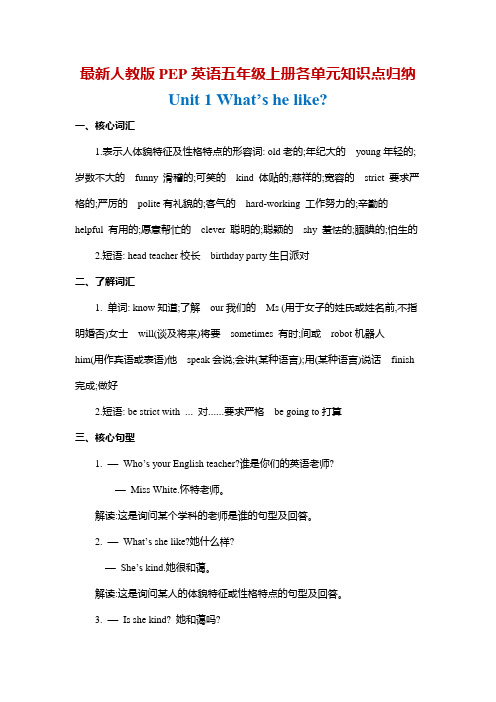
最新人教版PEP英语五年级上册各单元知识点归纳Unit 1 What’s he like?一、核心词汇1.表示人体貌特征及性格特点的形容词: old老的;年纪大的young年轻的;岁数不大的funny 滑稽的;可笑的kind 体贴的;慈祥的;宽容的strict 要求严格的;严厉的polite有礼貌的;客气的hard-working 工作努力的;辛勤的helpful 有用的;愿意帮忙的clever 聪明的;聪颖的shy 羞怯的;腼腆的;怕生的2.短语: head teacher校长birthday party生日派对二、了解词汇1. 单词: know知道;了解our我们的Ms (用于女子的姓氏或姓名前,不指明婚否)女士will(谈及将来)将要sometimes 有时;间或robot机器人him(用作宾语或表语)他speak会说;会讲(某种语言);用(某种语言)说话finish 完成;做好2.短语: be strict with …对……要求严格be going to打算三、核心句型1. —Who’s your English teacher?谁是你们的英语老师?—Miss White.怀特老师。
解读:这是询问某个学科的老师是谁的句型及回答。
2. —What’s she like?她什么样?—She’s kind.她很和蔼。
解读:这是询问某人的体貌特征或性格特点的句型及回答。
3. —Is she kind? 她和蔼吗?—Yes, she is.是的,她和蔼。
解读:这是询问某人性格特点的一般疑问句,用yes或no回答。
4. He is very helpful at home.他在家里非常愿意帮忙。
解读:这是描述他人特征的句型。
四、了解句型1. Hey, Ms Wang will be our new Chinese teacher.嘿,王老师将会是我们的新语文老师。
解读: will表示将要发生的动作或状态,意思是“将要”,后加动词原形。
五年级上册英语素材 Units1-2单元重点词汇与句型归纳总结 人教PEP版

人教版英语五年级上册Units1-2Unit 1 What’s he like?【重点词汇】1.old /əʊld/ 老的;年纪大的2.young /jʌŋ/ 年轻的;岁数不大的3.funny /'fʌnɪ/ 滑稽;可笑的4.kind /kaɪnd/ 体贴的;慈祥的;宽容的5.strict /strɪkt/ 要求严格的;严厉的6.polite /pə'laɪt / 有礼貌的;客气的7.hard-working /ˈhɑːdˈwɜːkɪŋ/ 工作努力的;辛勤的8.helpful /'helpfʊl/ 有用的;愿意帮忙的9.clever 'klevə/ 聪明的;聪颖的10.shy /ʃaɪ/ 羞怯的;腼腆的;怕生气的11.know /nəʊ/ 知道;了解12.our /aʊə/ 我们的13.Ms /mɪz/ (用于女子的姓氏或姓名前,不指明婚否)女士14.will /wɪl/ (谈及将来)将要15.sometimes /'sʌmtaɪmz/ 有时;间或16.robot /'rəʊbɒt/ 机器人17.him /hɪm / (用作宾格或表语)他18.speak /spiːk/ 会说;会讲(某种语言);用(某种语言)说话19.finish /'fɪnɪʃ / 完成;做好【重点句型】1.This is Amy. She's quiet. She's very hard-working.这是艾米。
她很内向。
她很努力。
2.That is Wu Yifan. He's very clever. He's polite, too.那是吴一凡。
他很聪明。
他也很有礼貌。
3.—Ms Wang will be our new Chinese teacher. What's she like?王女士会成为我们的新语文老师。
她是怎样的人?—She's very kind.她很平易近人。
最新完整人教版五年级英语上册第五单元知识点归纳总结及作文范文

Unit 5 There is a big bed一、词汇与短语1、重点单词1. clock /klɒk/ 时钟;钟2.plant /plɑːnt 植物3.bottle /ˈbɒtl/ 瓶子4.bike /baɪk/ 自行车;脚踏车5.photo /ˈfəʊtəʊ/ 照片;相片6.front /frʌnt/ 正面7.between /bɪˈtwiːn/ 在……中间8.above /əˈbʌv/在(或向)……上面9.beside /bɪˈsaɪd/ 在旁边(附近)10.behind /bɪˈhaɪnd/ 在(或向)…后面11.there /ðeə(r)/(表示存在或发生)12.their /ðeə(r)/ 他们/她们/它们的13.house/haʊs , haʊz/ 房屋;房子;住宅14.lot/lɒt/ 大虽;许多15.flower /ˈflaʊə(r)/ 花;花朵16.move /muːv/ 搬家17.dirty /ˈdɜːtɪ/ 肮脏的18.mouse /maʊs/ 老鼠19.everywhere /ˈevriweə(r)/ 处处;到处20.grandparent /ˈɡrænpeərənt/ 祖父;祖母;外祖父;外祖母2、重点短语1. water bottle 水瓶2. in front of 在……前面3.a lot of = lots of 大量;许多4.so many pictures 许多照片5.many pretty flowers 很多漂亮的花6.in the room 房间里面7.beside the bed 在床旁边8.a nice photo 一张漂亮的照片9.on the desk 在桌子上10.in the picture 在图片中11.on the plate 在盘子上12.in my room 在我房间里13.in front of the house 在房子前面14.lots of flowers 许多花15.move into…搬进…16.on the floor 在地板上17.everywhere 到处,处处18.behind my computer 在我电脑后面19.near the nature park在自然公园附近20.above the desk 在桌子下面21.beside the river 在河边22.go home 回家23.poor can 可怜的罐头24.be late for school 上学迟到了25.between two fish 两条鱼之间26.Over Rabbit 在兔子头顶上3、重点句子1. There is a big bed. (这里)有张大床。
新人教版小学英语五年级上册3-4单元重点知识点
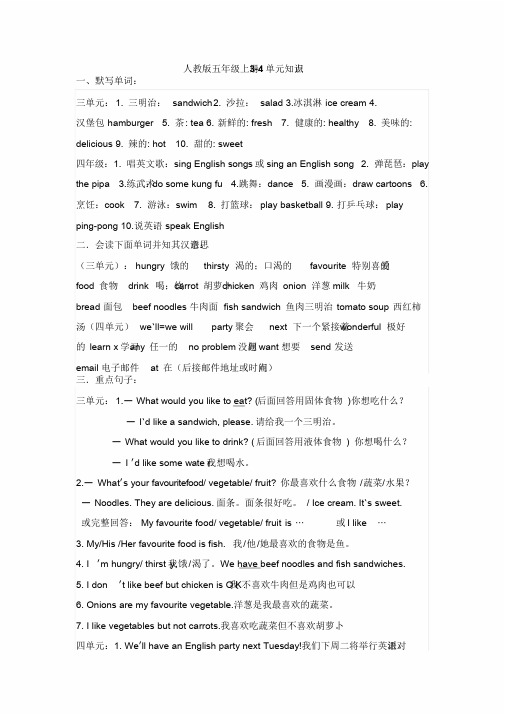
点3-4单元知识人教版五年级上册一、默写单词:三单元:1. 三明治:sandwich 2. 沙拉:salad 3.冰淇淋ice cream 4.汉堡包hamburger 5. 茶: tea 6. 新鲜的: fresh 7. 健康的: healthy 8. 美味的: delicious 9. 辣的: hot 10. 甜的: sweet四年级:1. 唱英文歌:sing English songs或sing an English song 2. 弹琵琶:play the pipa 3.练武术:do some kung fu 4.跳舞:dance 5. 画漫画:draw cartoons 6. 烹饪:cook 7. 游泳:swim 8. 打篮球:play basketball 9. 打乒乓球:playping-pong 10.说英语:speak English:二.会读下面单词并知其汉语意思的(三单元):hungry 饿的thirsty 渴的;口渴的favourite 特别喜爱food 食物drink 喝;饮c arrot 胡萝卜c hicken 鸡肉onion 洋葱milk 牛奶bread 面包beef noodles 牛肉面fish sandwich 鱼肉三明治tomato soup 西红柿汤(四单元)we`ll=we will party 聚会next 下一个紧接着w onderful 极好题want 想要send 发送的learn x 学习a ny 任一的no problem没问email 电子邮件at 在(后接邮件地址或时间点)三.重点句子:三单元:1.—What would you like to eat? (后面回答用固体食物)你想吃什么?—I`d like a sandwich, please. 请给我一个三明治。
—What would you like to drink? (后面回答用液体食物) 你想喝什么?—I ’d like some wate我r. 想喝水。
(完整版)新人教版五年级英语上册单元词汇表

新人教版五年级英语上册单元词汇表Unit 1 描述人物1.old 老的,年纪大的2.young 年轻的;岁数不大的3.funny 滑稽的;可笑的4.kind 体贴的;慈祥的;宽容的5.strict 要求严格的;严厉的6.polite 有礼貌的;客气的7.hard-working 工作努力的;辛勤的8.helpful 愿意帮忙的9.clever 聪明的;聪颖的10.shy 羞怯的;腼腆的;怕生的11.know 知道;了解12.our 我们的13.Ms (用于女子的姓氏或姓名前,不指明婚否)女士14.will (谈及将来)将要15.sometimes 有时;间或16.robot 机器人17.him (用作宾语或表语)他18.speak 会说;会讲(某种语言);用(某种语言)说话19.finish 完成;做好Unit 2 星期及一周活动1.Monday 星期一2.Tuesday 星期二3.Wednesday 星期三4.Thursday 星期四5.Friday 星期五6.Saturday 星期六7.Sunday 星期日8.weekend 周末9.wash 洗10.wash my clothes 洗我的衣服11.watch TV 看电视12.do 做;干13.do homework 做作业14.read 看;读15.read books 看书16.play football 踢足球17.cooking 烹饪;烹调18.often 时常;常常19.park 公园20.tired 疲倦的21.sport 体育运动22.play sports 做体育运动23.should (常用于纠正别人)应该,应当24.every 每一个,每个25.day 一天;一日26.schedule 工作计划;日程安排Unit 3 食物及味道1.sandwich 三明治2.salad 蔬菜沙拉;混合沙拉3.hamburger 汉堡包4.ice cream 冰激凌5.tea 茶;茶水6.fresh 新鲜的;刚摘的7.healthy 健康的8.delicious 美味的;可口的9.hot 辣的;辛辣的10.sweet 含糖的;甜的11.drink 喝;饮12.thirsty 渴的;口渴的13.favourite 特别喜爱的14.food 食物15.Dear (用于信函抬头的名字或头衔前)亲爱的16.onion 洋葱;葱头Unit 4 活动或技能1.sing 唱;唱歌2.song 歌曲3.sing English songs 唱英文歌曲4.play the pipa 弹琵琶5.kung fu 功夫;武术6.do Kung fu 练武术7.dance 跳舞8.draw 画9.cartoon 漫画10.draw cartoon 画漫画11.cook 烹调;烹饪12.swim 游泳13.play basketball 打篮球14.ping-pong 乒乓球15.play ping-pang 打乒乓球16.speak English 说英语17.we’ll=we will18.party 聚会;派对19.next 下一个的;紧接着的;接下来的20.wonderful 极好的;了不起的21.learn 学;学习;学会22.any 任何的;任一的23.problem 问题24.no problem 没问题25.want 要;想要26.send 邮寄;发送27.email 电子邮件28.at (后面接邮件地址)Unit 5 物品及方位1.clock 时钟;钟2.plant 植物3.bottle 瓶子4.water bottle 水瓶5.bike 自行车;脚踏车6.photo 照片;相片7.front 正面8.in front of 在……前面9.between 在……中间10.above 在(或向)……上面11.beside 在旁边(附近)12.behind 在(或向)……后面13.there (表示存在或发生)14.grandparent 祖父;祖母;外祖父;外祖母15.their 他们的;她们的;它们的16.house 房屋;房子;住宅17.lot 大量;许多18.lots of 大量;许多19.flower 花;花朵20.move 搬家21.dirty 肮脏的22.everywhere 处处;到处23.mouse 老鼠24.live 住;居住25.nature 自然界;大自然Unit 6 地理1.forest 森林;林区2.river 河;江ke 湖;湖泊4.mountain 高山;山岳5.hill 山丘;小山6.tree 树;树木;乔木7.Bridge 桥8.building 建筑物;房子;楼房9.village 村庄;村镇10.house 房屋;房子;住宅11.boating 划船12.go boating 去划船13.aren’t=are not14.rabbit 兔;野兔15.high 高的。
新人教版PEP五年级英语上册各单元知识点总结
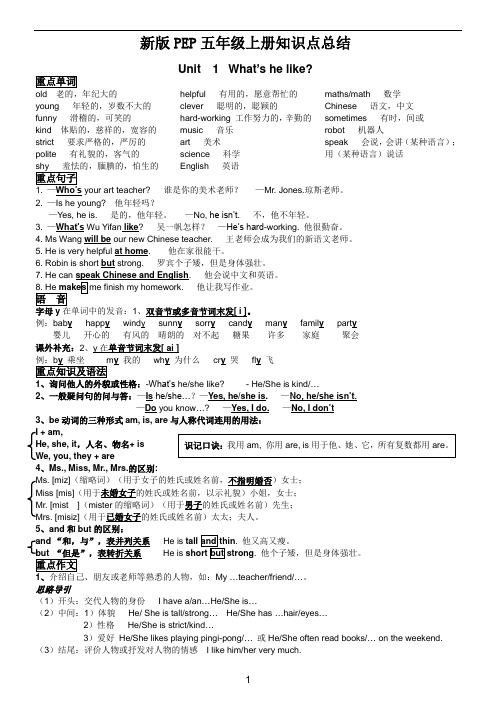
新版PEP 五年级上册知识点总结Unit 1 What ’s he like?old 老的,年纪大的young 年轻的,岁数不大的 funny 滑稽的,可笑的kind 体贴的,慈祥的,宽容的 strict 要求严格的,严厉的 polite 有礼貌的,客气的helpful 有用的,愿意帮忙的 clever 聪明的,聪颖的 hard-working 工作努力的,辛勤的 music 音乐 art 美术science 科学 English 英语maths/math 数学 Chinese 语文,中文 sometimes 有时,间或 robot 机器人 speak 会说,会讲(某种语言);用(某种语言)说话1. —Who’s your art teacher? 谁是你的美术老师? —Mr. Jones.琼斯老师。
2. —Is he young? 他年轻吗?—Yes, he is. 是的,他年轻。
—No, he isn’t. 不,他不年轻。
3. —What’s Wu Yifan like ? 吴一帆怎样? —He’s hard -working. 他很勤奋。
4. Ms Wang will be our new Chinese teacher. 王老师会成为我们的新语文老师。
5. He is very helpful at home . 他在家很能干。
6. Robin is short but strong. 罗宾个子矮,但是身体强壮。
他会说中文和英语。
他让我写作业。
1、双音节或多音节词末发[ i ]。
例:bab y happ y windy sunn y sorr y cand y man y famil y part y 婴儿 开心的 有风的 晴朗的 对不起 糖果 许多 家庭 聚会 课外补充:2、y 在单音节词末发[ ai ]m y 我的 wh y 为什么 cr y 哭 fl y 飞 1、询问他人的外貌或性格:-What’s he/she like? - He/She is kind/…2、一般疑问句的问与答:—Is he/she…?—Yes, he/she is. —No, he/she isn’t. —Do you know …? —Yes, I do. —No, I don ’t3、be 动词的三种形式am, is, are 与人称代词连用的用法:I + am,He, she, it ,人名、物名+ is We, you, they + are4、Ms., Miss, Mr., Mrs.的区别:Ms. [miz](缩略词)(用于女子的姓氏或姓名前,不指明婚否)女士; Miss [mis](用于未婚女子的姓氏或姓名前,以示礼貌)小姐,女士; Mr. [mist ](mister 的缩略词)(用于男子的姓氏或姓名前)先生; Mrs. [misiz](用于已婚女子的姓氏或姓名前)太太;夫人。
pep人教版小学五年级英语上册各单元知识点归纳

pep人教版小学五年级英语上册各单元知识点归纳最新版人教版小学五年级英语上册复重点知识Unit1 What he like?重点单词: old年老的young年轻的XXX滑稽的kind和蔼的strict严格的polite有礼貌的hard-working工作努力的helpful有用的clever聪明的shy害羞的sometimes有时will将要know知道robot机器人XXX完成he‵s=he is他是who‵s=who is谁是Mr.先生XXX小姐XXX女士重点句子:1、A: Ms Wang will be our new Chinese XXX.XXX使我们新语文老师A: What’s she like?她怎么样?B: She’s very kind?她很和蔼A: Is she strict?她严格吗?B:Yes,sometimes.是的,有时候.2、A: Do you know Mr Young?你认识XXX吗?B: No,I don’t (否认回覆)不,不熟悉。
Yes,I do(一定回覆)是的,我熟悉。
3、A: Who is yourmath XXX?谁是你的数学教师?B: Mr Li李师长教师。
4、A: Is she strict?她严厉吗?B: Yes,sheis.(肯定回答)是的,她严格。
No,XXX.(否定回答),不严格。
Unit2 My week重点单词:XXX星期一XXX星期二XXX星期三XXX星期四Friday星期五Saturday星期六Sunday星期日weekend周末washmyclothes洗衣服watch TV看电视do homework做家庭作业read books读书play football踢足球often通常cooking烹饪tired疲惫的sport体育运动should应该day一天重点句子:1、A:What do you have on Fridays?星期五你有什么课?B:I have a PE class我有体育课2、Do you often play sports?你常常做运动吗?No,I don’t.I don’t like sports不是.我不喜欢做运动3、A: What do we have on Wednesdays ?礼拜三我们都有甚么课?B: We have English、science and XXX.我们星期三有英语、科学和计算机。
五年级英语第三单元重点句子

五年级英语第三单元重点句子一、单词(基础积累,有助于理解句子)1. 描述外貌特征的单词。
- young(年轻的;年少的)- old(老的;年纪大的)- funny(滑稽的;可笑的)- kind(体贴的;慈祥的;宽容的)- strict(要求严格的;严厉的)- polite(有礼貌的;客气的)- hard - working(工作努力的;辛勤的)- helpful(有用的;愿意帮忙的)- clever(聪明的;聪颖的)- shy(羞怯的;腼腆的)2. 其他相关单词。
- music(音乐)- art(美术)- science(科学)- English(英语)- maths(数学)- Chinese(语文;汉语)二、重点句子。
1. 描述人物性格或外貌的句子。
- He's young.(他很年轻。
)- She's old.(她年纪大了。
)- He is funny.(他很滑稽。
)- My mother is kind.(我的妈妈很慈祥。
)- Our teacher is strict.(我们的老师很严格。
)- The boy is polite.(这个男孩很有礼貌。
)- She is hard - working.(她学习/工作很努力。
)- He is helpful.(他很乐于助人。
)- My sister is clever.(我的姐姐很聪明。
)- The girl is shy.(这个女孩很害羞。
)2. 询问人物性格或外貌的句子。
- What's he like?(他是什么样的人?)- What's she like?(她是什么样的人?)3. 描述学科老师特点的句子。
- Our music teacher is young.(我们的音乐老师很年轻。
)- My art teacher is funny.(我的美术老师很滑稽。
)- His science teacher is strict.(他的科学老师很严格。
人教版五年级上册英语第一单元知识点

人教版五年级上册英语第一单元知识点人教版五班级上册英语第一单元学问点一、重点单词old 老的,年纪大的young 年轻的,岁数不大的funny 滑稽的,可笑的kind 爱护的,慈爱的,宽容的strict 要求严格的,严峻的polite 有礼貌的,客气的shy 羞怯的,害羞的,怕生的helpful 有用的,情愿帮忙的clever 聪慧的,聪颖的hard-working 工作努力的,辛勤的music 音乐art 美术science 科学English 英语maths/math 数学Chinese 语文,中文sometimes 有时,间或robot 机器人speak 会说,会讲(某种语言);用(某种语言)说话二、重点句子1. —Who’s your art teacher? 谁是你的美术老师?—Mr. Jones.琼斯老师。
2. —Is he young? 他年轻吗?—Yes, he is. 是的,他年轻。
—No, he isn’t. 不,他不年轻。
3. —What’s Wu Yifan like? 吴一帆怎样?—He’shard-working. 他很勤奋。
4. Ms Wang will be our new Chineseteacher. 王老师会成为我们的新语文老师。
5. Heis very helpful at home. 他在家很能干。
6. Robin is short but strong. 罗宾个子矮,但是身体强壮。
7. He can speak Chinese and English. 他会说中文和英语。
8. Hemakes me finish myhomework. 他让我写作业。
三、语音字母y在单词中的发音:1、双音节或多音节词末发[ i]。
例:baby happy windy sunny sorry candy many family party 婴儿快乐的有风的晴朗的对不起糖果很多家庭聚会课外补充:2、y在单音节词末发[ ai ]例:by 乘坐my我的why 为什么cry哭fly 飞四、重点学问及语法1、询问他人的外貌或性格:-What’she/she like? - He/She is kind/…2、一般疑问句的问与答:—Is he/she…?—Yes, he/she is. —No,he/she isn’t.—Do you know…? —Yes,I do. —No, I don’t3、be动词的三种形式am, is, are与人称代词连用的用法:识记口诀:我用am, 你用are, is用于他、她、它,全部复数都用are。
人教版五年级上册英语知识点重点难点考点汇总
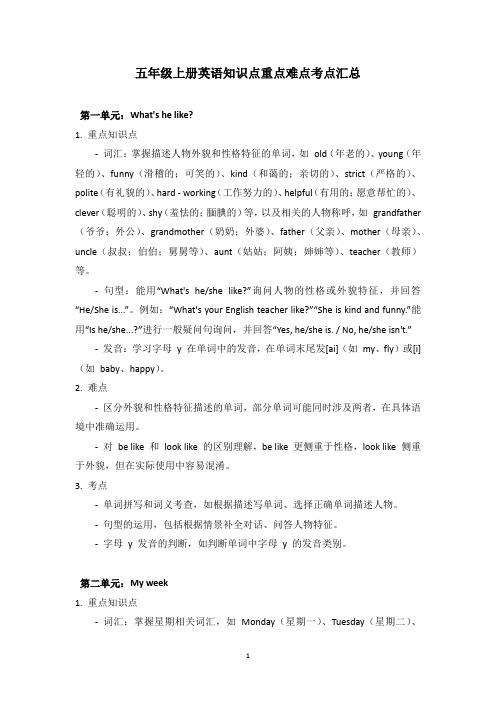
五年级上册英语知识点重点难点考点汇总第一单元:What's he like?1. 重点知识点-词汇:掌握描述人物外貌和性格特征的单词,如old(年老的)、young(年轻的)、funny(滑稽的;可笑的)、kind(和蔼的;亲切的)、strict(严格的)、polite(有礼貌的)、hard - working(工作努力的)、helpful(有用的;愿意帮忙的)、clever(聪明的)、shy(羞怯的;腼腆的)等,以及相关的人物称呼,如grandfather (爷爷;外公)、grandmother(奶奶;外婆)、father(父亲)、mother(母亲)、uncle(叔叔;伯伯;舅舅等)、aunt(姑姑;阿姨;婶婶等)、teacher(教师)等。
-句型:能用“What's he/she like?”询问人物的性格或外貌特征,并回答“He/She is...”。
例如:“What's your English teacher like?”“She is kind and funny.”能用“Is he/she...?”进行一般疑问句询问,并回答“Yes, he/she is. / No, he/she isn't.”-发音:学习字母y 在单词中的发音,在单词末尾发[ai](如my、fly)或[i](如baby、happy)。
2. 难点-区分外貌和性格特征描述的单词,部分单词可能同时涉及两者,在具体语境中准确运用。
-对be like 和look like 的区别理解,be like 更侧重于性格,look like 侧重于外貌,但在实际使用中容易混淆。
3. 考点-单词拼写和词义考查,如根据描述写单词、选择正确单词描述人物。
-句型的运用,包括根据情景补全对话、问答人物特征。
-字母y 发音的判断,如判断单词中字母y 的发音类别。
第二单元:My week1. 重点知识点-词汇:掌握星期相关词汇,如Monday(星期一)、Tuesday(星期二)、Wednesday(星期三)、Thursday(星期四)、Friday(星期五)、Saturday(星期六)、Sunday(星期日),以及课程和日常活动词汇,如Chinese(语文)、English(英语)、maths(数学)、science(科学)、music(音乐)、PE(体育)、art(美术)、wash my clothes(洗衣服)、watch TV(看电视)、do homework(做作业)、read books (读书)等。
新人教版PEP五年级英语上册各单元知识点总结(1)

新版PEP五年级上册知识点总结Unit 1 What’s he like?重点单词old 老的,年纪大的young 年轻的,岁数不大的funny 滑稽的,可笑的kind 体贴的,慈祥的,宽容的strict 要求严格的,严厉的polite 有礼貌的,客气的shy 羞怯的,腼腆的,怕生的helpful 有用的,愿意帮忙的clever 聪明的,聪颖的hard-working工作努力的,辛勤的music 音乐art 美术science 科学English 英语maths/math 数学Chinese 语文,中文sometimes 有时,间或robot 机器人speak 会说,会讲(某种语言);用(某种语言)说话重点句子1. —Who’s your art teacher? 谁是你的美术老师?—Mr. Jones.琼斯老师。
2. —Is he young? 他年轻吗?—Yes, he is. 是的,他年轻。
—No, he isn’t. 不,他不年轻。
3. —What’sWu Yifan like? 吴一帆怎样?—He’s hard-working. 他很勤奋。
4. Ms Wang will be our new Chinese teacher. 王老师会成为我们的新语文老师。
5. He is very helpful at home. 他在家很能干。
6. Robin is short but strong. 罗宾个子矮,但是身体强壮。
7. He can s peak Chinese and English. 他会说中文和英语。
8. He makes me finish my homework. 他让我写作业。
语音字母y在单词中的发音:1、双音节或多音节词末发[ i ]。
例:bab y happy windy sunn y sorry cand y many famil y party 婴儿开心的有风的晴朗的对不起糖果许多家庭聚会课外补充:2、y在单音节词末发[ ai ]例:by 乘坐my 我的why 为什么cry 哭fl y 飞重点知识及语法1、询问他人的外貌或性格:-What’s he/she like? - He/She is kind/…2、一般疑问句的问与答:—Is he/she…?—Yes, he/she is.—No, he/she isn’t.—Do you know…? —Yes, I do.—No, I don’t3、be动词的三种形式am, is, are与人称代词连用的用法:I + am,He, she, it,人名、物名+ isWe, you, they + are4、Ms., Miss, Mr., Mrs.的区别:Ms. [miz](缩略词)(用于女子的姓氏或姓名前,不指明婚否)女士;Miss [mis](用于未婚女子的姓氏或姓名前,以示礼貌)小姐,女士;Mr. [mist](mister的缩略词)(用于男子的姓氏或姓名前)先生;Mrs. [misiz](用于已婚女子的姓氏或姓名前)太太;夫人。
新人教版PEP五年级英语上册各单元重点知识归纳

新人教版PEP五年级英语上册各单元重点知识归纳Unit 1: Hello!- Greetings: Hello, Hi, Good morning, Goodbye- Introducing oneself: My name is..., I'm..., Nice to meet you- Numbers: 1-20- Classroom objects: desk, chair, book, pen, pencil, rulerUnit 2: My Schoolbag- Stationery items: eraser, pencil sharpener, glue, crayons, scissors - Colors: red, blue, green, yellow, black, white- Personal pronouns: I, you- Plural forms of nouns: pens, pencils, rulers, booksUnit 3: My Friends- Adjectives: happy, sad, tall, short, thin, fat- Describing appearance: He/She is..., They are...- Possessive adjectives: my, your, his, her, their- Talking about friends: I have a friend. His/Her name is... Unit 4: My Home- Rooms in a house: living room, bedroom, kitchen, bathroom - Prepositions: in, on, under, near- Furniture: sofa, bed, table, chair- Demonstrative pronouns: this, that, these, thoseUnit 5: Food and Drinks- Food items: apple, banana, orange, sandwich, hamburger- Drinks: water, milk, juice, tea- Expressing likes and dislikes: I like..., I don't like...- Question words: What, Where, WhoUnit 6: At the Market- Fruit: grapes, strawberries, watermelon, pineapple- Vegetables: carrot, tomato, onion, potato- Countable and uncountable nouns: an apple, some bananas, a glass of milk- Shopping phrases: How much is..., I want...Unit 7: In the Park- Outdoor activities: play football, fly a kite, ride a bicycle- Weather: sunny, rainy, windy- Present continuous tense: I am playing, He is running- Adverbs: slowly, quicklyUnit 8: My Family- Family members: father, mother, brother, sister- Describing relationships: This is my..., He/She is my...- Possessive 's: Dad's book, Mom's bag- Expressing family activities: We have dinner, We go swimmingUnit 9: At the Zoo- Animals: panda, lion, elephant, giraffe, monkey, tiger- Describing animals: big, small, tall, short, fast, slow- Present simple tense: Lions eat meat, Monkeys swing on trees - Plural forms of animals: pandas, monkeys, tigersUnit 10: At the Farm- Farm animals: cow, horse, pig, chicken, goat- Animal sounds: moo, neigh, oink, cluck, baa- Expressing abilities: I can..., He/She can...- Prepositions of location: in front of, behindUnit 11: Nature Park- Nature elements: river, tree, flower, grass, mountain- Adverbs of frequency: always, usually, sometimes, never- Asking about preferences: Do you like..., Which do you like...Unit 12: Let's Celebrate!- Festivals: Christmas, Spring Festival, Easter, Halloween- Activities during festivals: decorate, light candles, give gifts - Recounting past events: Last year, I..., We...。
新人教版五年级英语各单元词汇及重点句子

新人教版五年级英语各单元词汇及重点句子五上单词Unit 1 What’s he like"old 老的,年纪大的young 年轻的;岁数不大的funny 滑稽的;可笑的kind 体贴的;慈祥的;宽容的strict 要求严格的;严厉的polite 有礼貌的;客气的hard-working 工作努力的;辛勤的helpful 愿意帮助clever 聪明的;聪颖的shy 羞怯的;腼腆的;怕生的know 知道;了解our 我们的M〔用于女子的姓氏或**前,不指明婚否〕女士will 〔谈及将来〕将要sometimes 有时;间或robot 机器人him〔用作宾语或表语〕他speak 会说;会讲〔*种语言〕;用〔*种语言〕说话finish 完成;做好Unit 2 My weekMonday 星期一Tuesday 星期二Wednesday 星期三Thursday 星期四Friday 星期五Saturday 星期六Sunday 星期日weekend 周末wash 洗wash my clothes洗我的衣服watch TV 看电视do 做;干do homework做作业read看;读read books 看书play football 踢足球cooking 烹饪;烹调often 时常;常常park公园tired 疲倦的sport体育运动play sports 做体育运动should 〔常用于纠正别人〕应该,应当every 每一个,每个day 一天;一日schedule 工作方案;日程安排Unit 3 What would you like"sandwich **治salad 蔬菜沙拉;混合沙拉hamburger 汉堡包ice cream 冰激凌tea茶;茶水fresh 新鲜的;刚摘的healthy安康的delicious 美味的;可口的hot 辣的;辛辣的sweet 含糖的;甜的drink 喝;thirsty渴的;口渴的favourite特别喜爱的food食物Dear (用于信函抬头的名字或头衔前〕亲爱的onion 洋葱;葱头Unit 4 What can you do"sing 唱;唱歌song 歌曲sing English songs 唱英文歌曲play the pipa 弹琵琶kung fu功夫;武术do Kung fu 练武术dance 跳舞draw 画cartoon 漫画draw cartoon 画漫画cook 烹调;烹饪swim 游泳play basketball打篮球ping-pong 乒乓球play ping-pang 打乒乓球speak English说英语we’ll=we will party 聚会;派对ne*t下一个的;紧接着的;接下来的wonderful 极好的;了不起的learn 学;学习;学会any 任何的;任一的problem 问题no problem 没问题want 要;想要send 邮寄;发送email 电子at 〔后面接地址〕Unit 5 There is a big bedclock 时钟;钟plant 植物bottle 瓶子water bottle 水瓶bike 自行车;脚踏车photo 照片;相片front 正面in front of在……前面between 在……中间above 在〔或向〕……上面beside 在旁边〔附近〕behind 在〔或向〕……后面there 〔表示存在或发生〕grandparent祖父;祖母;外祖父;外祖母their他们的;她们的;它们的house房屋;房子;住宅lot 大量;许多lots of 大量;许多flower 花;花朵move 搬家dirty 肮脏的everywhere处处;到处mouse老鼠live 住;居住nature自然界;大自然Unit 6 In a nature parkforest 森林;林区river 河;江lake 湖;湖泊mountain 高山;hill 山丘;小山tree树;树木;乔木bridge桥building建筑物;房子;楼房village 村庄;村house 房屋;房子, 住宅boating 划船go boating 去划船aren’t=are not rabbit 兔;野兔high 高的五上句子Unit 1 What’s he like"Is he young"他年轻吗?No, he isn’t.不,他不年轻。
- 1、下载文档前请自行甄别文档内容的完整性,平台不提供额外的编辑、内容补充、找答案等附加服务。
- 2、"仅部分预览"的文档,不可在线预览部分如存在完整性等问题,可反馈申请退款(可完整预览的文档不适用该条件!)。
- 3、如文档侵犯您的权益,请联系客服反馈,我们会尽快为您处理(人工客服工作时间:9:00-18:30)。
新人教版五年级英语各单元词汇及重点句子五上单词Unit 1 What’s he likeold 老的,年纪大的young 年轻的;岁数不大的funny 滑稽的;可笑的kind 体贴的;慈祥的;宽容的strict 要求严格的;严厉的polite 有礼貌的;客气的hard-working 工作努力的;辛勤的helpful 愿意帮忙clever 聪明的;聪颖的shy 羞怯的;腼腆的;怕生的know 知道;了解our 我们的M(用于女子的姓氏或姓名前,不指明婚否)女士will (谈及将来)将要sometimes 有时;间或robot 机器人him(用作宾语或表语)他speak 会说;会讲(某种语言);用(某种语言)说话finish 完成;做好Unit 2 My weekMonday 星期一Tuesday 星期二Wednesday 星期三Thursday 星期四Friday 星期五Saturday 星期六Sunday 星期日weekend 周末wash 洗wash my clothes洗我的衣服watch TV 看电视do 做;干do homework做作业read看;读read books 看书play football 踢足球cooking 烹饪;烹调often 时常;常常park公园tired 疲倦的sport体育运动play sports 做体育运动should (常用于纠正别人)应该,应当every 每一个,每个day 一天;一日schedule 工作计划;日程安排Unit 3 What would you likesandwich 三明治salad 蔬菜沙拉;混合沙拉hamburger 汉堡包ice cream 冰激凌tea茶;茶水fresh 新鲜的;刚摘的healthy健康的delicious 美味的;可口的hot 辣的;辛辣的sweet 含糖的;甜的drink 喝;thirsty渴的;口渴的favourite特别喜爱的food食物Dear (用于信函抬头的名字或头衔前)亲爱的onion 洋葱;葱头Unit 4 What can you dosing 唱;唱歌song 歌曲sing English songs 唱英文歌曲play the pipa 弹琵琶kung fu功夫;武术do Kung fu 练武术dance 跳舞draw 画cartoon 漫画draw cartoon 画漫画cook 烹调;烹饪swim 游泳play basketball打篮球ping-pong 乒乓球play ping-pang 打乒乓球speak English说英语we’ll=we will party 聚会;派对next下一个的;紧接着的;接下来的wonderful 极好的;了不起的learn 学;学习;学会any 任何的;任一的problem 问题no problem 没问题want 要;想要send 邮寄;发送email 电子邮件at (后面接邮件地址)Unit 5 There is a big bedclock 时钟;钟plant 植物bottle 瓶子water bottle 水瓶bike 自行车;脚踏车photo 照片;相片front 正面in front of在……前面between 在……中间above 在(或向)……上面beside 在旁边(附近)behind 在(或向)……后面there (表示存在或发生)grandparent祖父;祖母;外祖父;外祖母their他们的;她们的;它们的house房屋;房子;住宅lot 大量;许多lots of 大量;许多flower 花;花朵move 搬家dirty 肮脏的everywhere处处;到处mouse老鼠live 住;居住nature自然界;大自然Unit 6 In a nature parkforest 森林;林区river 河;江lake 湖;湖泊mountain 高山;hill 山丘;小山tree树;树木;乔木bridge桥building建筑物;房子;楼房village 村庄;村house 房屋;房子, 住宅boating 划船go boating 去划船aren’t=are not rabbit 兔;野兔high 高的五上句子Unit 1 What’s he likeIs he young他年轻吗No, he isn’t.不,他不年轻。
What’sshelike她怎么样She’sverykind.她很和蔼Unit 2 My week5.WhatdoyouhaveonThursdays星期四你有什么课have maths. English and music.我有数学、英语和音乐课。
7.Doyouoftenread books in this park你经常在这个公园里看书吗8. No, I don’t.不,我不经常在这里看书。
Unit 3 What would you like9. Whatwouldyouliketoeat你想吃什么sandwich, please.请给我一个三明治。
11.Whatwouldyouliketodrink你想喝什么’dlikesomewater.I’mthirsty.我想要一些水。
我渴了。
13. What’s your favourite food你最喜欢吃什么实物14. Noodles. They’re delicious.面条。
面条很好吃。
Unit 4 What can you do:Whatcanyoudofortheparty, children你们能为联欢会做什么,孩子们can singEnglishsongs.我会唱英文歌曲.17. CanyoudoanyKungfu你能练武术吗,Ican.(肯定回答)是的,我能。
,Ican’t.(否定回答)不,我不能。
Unit 5 There is a big bed20. Thereisabig bed.(这里)有张大床。
21. Therearesomanypictureshere。
这里有如此多的画。
Unit6Inanatureparkthereariverin the forest, Miss White怀特小姐,森林里有河吗23.Yes,thereis.(肯定回答)是的,有。
/No,thereisn’t.(否定回答)不,没有。
24.Arethereanytall buildings in the nature park自然公园里有高楼吗,thereare.是的,有一些。
No,therearen’t.不,没有。
五年级下册Unit 1 My daydo morning exercises 晨练eat breakfast 吃早饭have English class 上英语课play sports 进行体育运动eat dinner 吃晚饭when 什么时候evening 夜晚;晚上get up 起床at 在……点钟usually通常;一般noon 中午climb mountains 爬山go shopping 购物;买东西play the piano 弹钢琴visit grandparents 看望祖父母go hiking 去远足weekend 周末often 经常sometimes 有时候Unit 2 My favourite seasonspring 春天summer 夏天fall 秋天winter 冬天season 季节which 哪一个best 最;极swim 游泳fly kites 放风筝skate 滑冰;滑冰鞋make a snowman 堆雪人plant trees 种树why 为什么because 因为sleep 睡觉Unit 3 My school calendar(日历表)Jan. / January 一月Feb. / February 二月Mar. / March 三月Apr. / April 四月May 五月June 六月July七月Aug. / August八月Sept. / September 九月Oct. / October 十月Nov. / November 十一月Dec. / December 十二月birthday 生日uncle 叔叔;舅舅her 她的date 日期Unit 4 When is Easter(复活节)draw pictures 画画cook dinner 做饭read a book 看书answer the phone 接电话listen to music听音乐clean the room 打扫房间write a letter 写信write an e-mail 写电子邮件mom 妈妈grandpa 爷爷,外公study书房Unit 5 Whose dog is itfly飞jump 跳walk 走run 跑swim游泳kangaroo 袋鼠sleep睡觉climb往上爬fight打架swing荡;荡秋千drink water喝水Unit 6 Work quietly!take pictures 照相watch insects 观察昆虫pick up leaves 采摘树叶do an experiment 做实验catch butterfly 捉蝴蝶honey 蜂蜜count insects 数昆虫collect leaves 收集树叶write a report 写报告play chess 下棋have a picnic 举行野餐五年级下册重点句子Unit 1 My daydo you finish class in the morning 你们上午的课几点结束finish class at 1 o‘clock我们一点钟结束上午的课do you do on the weekend你周末做什么often watch TV and play ping-pong with my father.我经常看电视,也常和我的爸爸一起打乒乓球.Unit 2 My favourite seasonseason do you like best,Mike迈克,你最喜欢哪个季节.冬天为什么I like summer vacation.因为我喜欢暑假Unit 3 My school calendar(日历表)is the party聚会什么时候举行’s in April在四月.is the trip this year今年的秋游在什么时候’s in October,We’ll go to the Great wall。
在十月,我们将去长城。
Unit 4 When is Easter(复活节)is April Fool’s day愚人节是哪天’s on April 1st。
